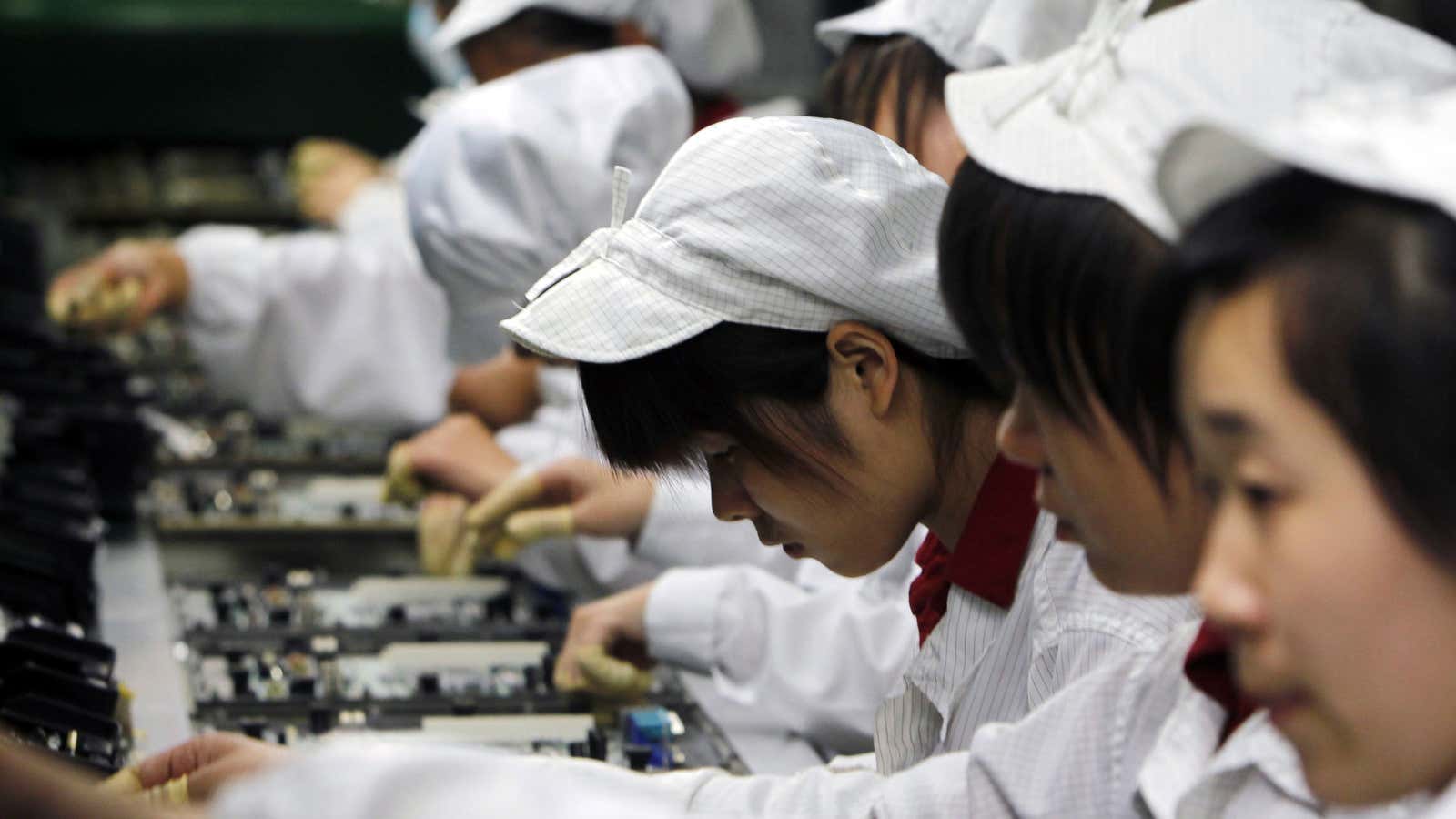Apple has confirmed something many China watchers have long suspected: that multinationals take an eyes-wide-shut approach to auditing their low cost suppliers.
In its latest supplier report (pdf) Apple said it had greatly expanded its audit process in 2012 , carrying out 72% more audits than in 2011 to delve deeper into its Chinese supply chain. Unsurprisingly, it found a host of problems. Its worst finding was that one of its manufacturers—which supplies other companies too—was employing 74 children. In total, it found 106 cases of child labor across its factories. Apple also reported that 158 of the factories it uses were not auditing their own suppliers.
We italicize the last part of that sentence because failing to probe Chinese suppliers’ subcontractors is something labor activists and manufacturing experts have long suspected multinationals do.
The Western buyers who travel to the industrial hubs of south-east China in search of ever cheaper labor talk openly about the problem, documented here and in further detail in Alexandra Harney’s book “The China Price,” of “five-star factories” and “shadow factories.”
The deal is that when a Western buyer takes business to a new factory, the boss will show off a facility where staff who seem happy with their lot are working 7-10 hour days with decent meal breaks. That is the five-star factory. And some multinationals may stop their audits right there.
However, because China’s rising wage inflation means “five-star” facilities are expensive to run, it is not uncommon for factory owners to sub-contract orders to sweatshops that mistreat staff and employ children.
Apple’s report also show startlingly high numbers of its Chinese factories were involved in bad labor and environmental practices. That is a further reason other multinationals should delve more into their own supply chains.
Apple found:
- 11 of its factories employed underage workers
- At these 11 factories, there were 106 active cases of child labor and 70 historical cases
- Only one of the 11 factories had sufficient controls to verify workers ages or detect false documentation
- 8 of its facilities used “bonded labor” – where unscrupulous agencies import workers from other countries and charge them huge debts for immigration and securing employment
- 106 of its facilities were not recycling or disposing of hazardous waste as required by law
- 119 facilities lacked management procedures for labeling hazardous waste.
Apple says in its report that it did not find child labor at any of its “final assembly suppliers.”
So what it did then was to: ”go deeper into our supply chain to ensure that there are no underage workers at any Apple supplier. Many suppliers tell us that we are the only company performing these audits.”
And it found that one of its components suppliers—named Guangdong Real Faith Pingzhou Electronics Co.—had employed 74 child workers.
There was no initial proof the components company was using child labor. Guangdong Real Faith had sourced the workers from an agency named Shenzhen Quanshan Human Resources, which itself had falsified underage workers’ documents, Apple said.
Apple alleged Shenzhen Quanshan had “knowingly provided the children” to its supplier and “conspired with families to forge age verification documents.”
And the Cupertino-based tech giant was clear it could not be the only electronics company to have fallen victim to such practices.
In its report, Apple says Guangdong Real Faith “produces a standard circuit board component used by many other companies in many industries.” It adds that Shenzhen Quanshan is one of the largest labor agencies in its region.
The US computer maker had become associated with labor rights abuses in the wake of a spate of worker suicides at Foxconn, its major Chinese supplier. Now Apple does appear to have gone further than most firms in looking for bad practices.
By suggesting it is doing more than industry peers to locate and stamp out such issues, it has transferred some of that heat to other multinationals that source from China. That is not such a bad thing. Apple’s report may prompt journalists, policymakers, shareholders and customers to ask other companies how deeply they are examining their own supply chains.




